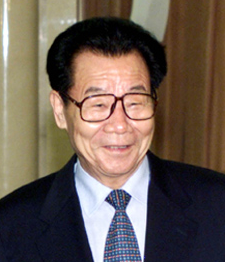This article includes a list of references, related reading, or external links, but its sources remain unclear because it lacks inline citations .(February 2013) |
Li Ruihuan | |||||||||
|---|---|---|---|---|---|---|---|---|---|
| 李瑞环 | |||||||||
 Li in 2000 | |||||||||
| 6th Chairman of the Chinese People's Political Consultative Conference | |||||||||
| In office 27 March 1993 –13 March 2003 | |||||||||
| Deputy | Ye Xuanping | ||||||||
| Preceded by | Li Xiannian | ||||||||
| Succeeded by | Jia Qinglin | ||||||||
| Party Secretary of Tianjin | |||||||||
| In office September 1987 –October 1989 | |||||||||
| Preceded by | Ni Zhifu | ||||||||
| Succeeded by | Tan Shaowen | ||||||||
| Mayor of Tianjin | |||||||||
| In office May 1982 –October 1989 | |||||||||
| Preceded by | Hu Qili | ||||||||
| Succeeded by | Nie Bichu | ||||||||
| Personal details | |||||||||
| Born | September 17,1934[ citation needed ] Baodi,Tianjin,Republic of China | ||||||||
| Political party | Chinese Communist Party | ||||||||
| Children | 2 sons | ||||||||
| Alma mater | Beijing Construction Engineering College | ||||||||
| Profession | Carpenter | ||||||||
| Chinese name | |||||||||
| Traditional Chinese | 李瑞環 | ||||||||
| Simplified Chinese | 李瑞环 | ||||||||
| |||||||||
Li Ruihuan (born September 17,[ citation needed ] 1934) is a Chinese retired politician. Li was a member of the Politburo Standing Committee of the Chinese Communist Party (CCP),China's top decision-making body,between 1989 and 2002. Li served as Chairman of the 9th National Committee of the Chinese People's Political Consultative Conference (CPPCC) from 1993 to 2003;before that,he was the CCP secretary of Tianjin.
